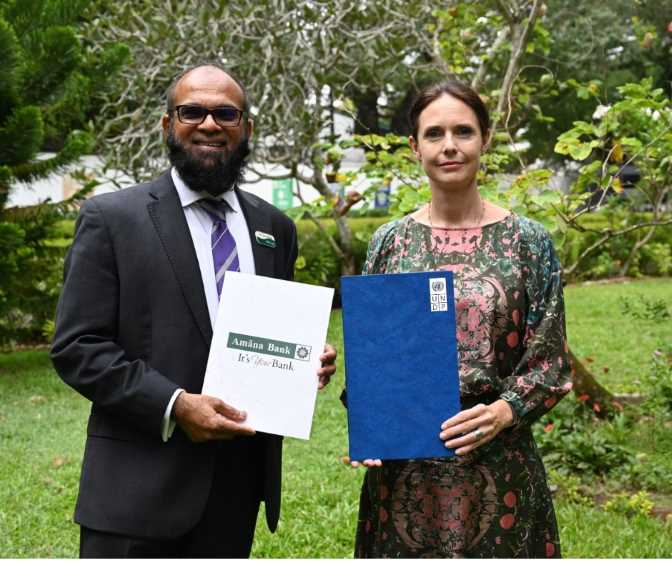
Colombo, Sri Lanka, 9 September 2022: Amana Bank recently partnered with the United Nations Development Programme (UNDP) in Sri Lanka, to channel support through the recently launched ‘Private Sector Giving Facility for Emergency Relief’, initiated towards overcoming the rising challenge of severe medical and food supply shortages due to the ongoing economic crisis.
By pledging support to this initiative, Amana Bank joins hands with many other leading corporates including Hemas Holdings, Dilmah Ceylon Tea, Brandix, Daraz and Citi Foundation, through whose collaboration UNDP will secure contributions towards procurement of medical supplies and address food security needs.
Commenting on the collaboration, Amana Bank’s Managing Director/CEO Mohamed Azmeer said, “With the country going through a challenging period, Amana Bank is committed to supporting the country and its people, since it is an integral part of the values based on which the unique people-friendly model of banking is built upon. Through this collaboration with UNDP, we aim to provide a platform to our customers as well as well-wishers to contribute to this timely cause and support the socio-economic recovery for the most vulnerable communities in the country, and hopefully drive a sustainable change.”
Speaking on the partnership, Ms. Malin Herwig, Officer-in-Charge, UNDP in Sri Lanka stated, “Partners are key agents in times of crisis, with the private sector historically playing a critical and strategic role in humanitarian efforts. UNDP works with a wide range of partners such as Amana Bank, in achieving our shared vision to help countries achieve sustainable development by eradicating poverty in all its forms and dimensions, accelerating structural transformations for sustainable development, and building resilience to crises and shocks.”
Contributions will be channelled towards procuring relevant seeds and materials for Maha season harvesting and raising awareness towards strengthening home gardening activities. According to the July 2022 Food Security Survey conducted by World Food Programme, nearly half of Sri Lankan households are food insecure, reflecting a substantial deteriorating trend from the previous survey month. The UNDP private sector facility and related interventions will complement and strengthen the ongoing health sector efforts of the Ministry of Health and the World Health Organization (WHO), and food sector efforts led and coordinated by the Food and Agriculture Organization (FAO) among others.



